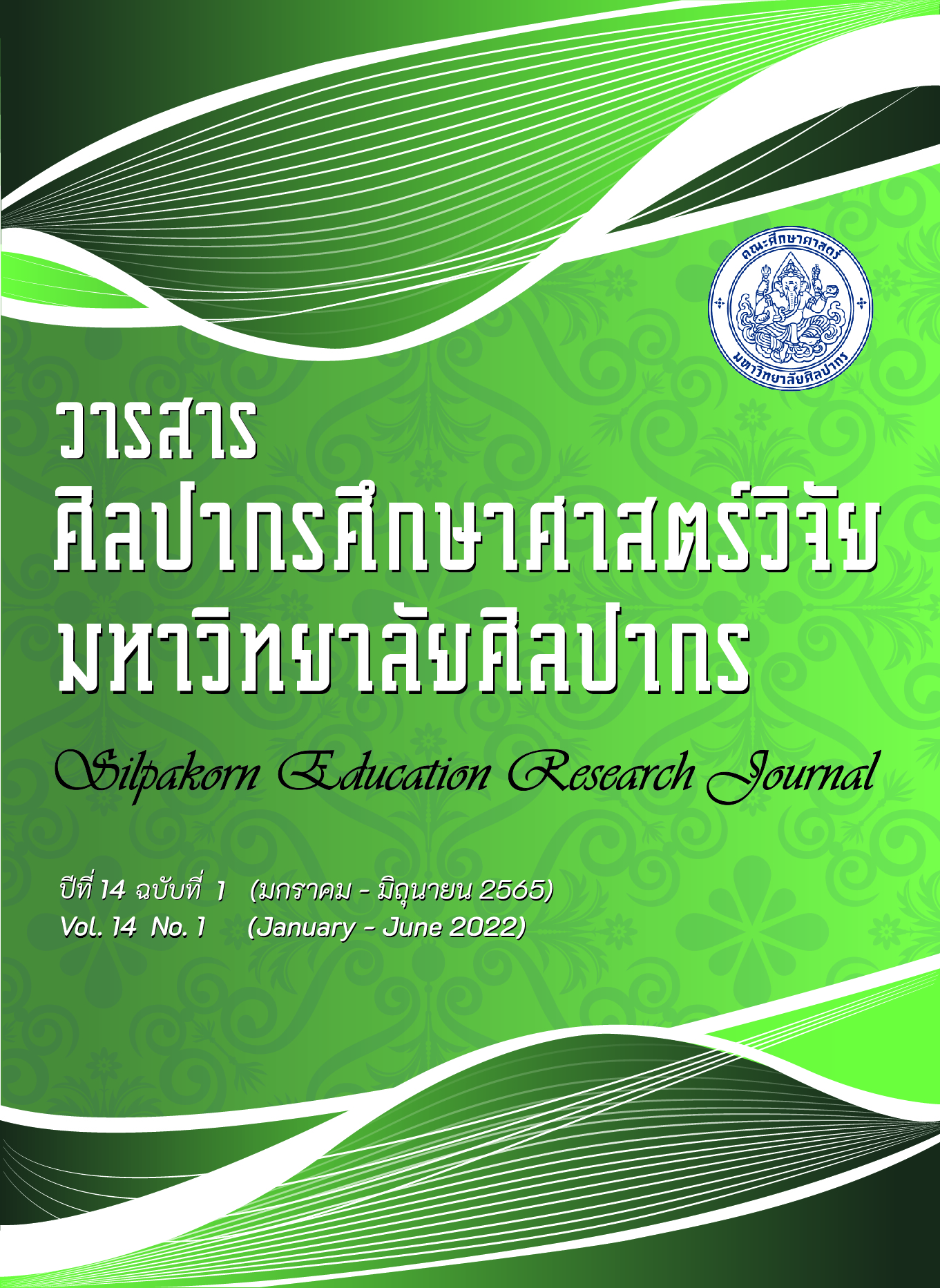การพัฒนาผลสัมฤทธิ์ทางการเรียนออนไลน์รายวิชา ชีววิทยา 3 ของนักเรียนชั้นมัธยมศึกษาปีที่ 5 ภายใต้การเรียนการสอนแบบออนไลน์ ผ่านการเรียนรู้ทางสื่อสังคมออนไลน์ Facebook
คำสำคัญ:
การเรียนการสอนแบบออนไลน์, ผลสัมฤทธิ์ทางการเรียน, สื่อสังคมออนไลน์ Facebookบทคัดย่อ
งานวิจัยนี้มีวัตถุประสงค์เพื่อ 1) เปรียบเทียบผลสัมฤทธิ์ทางการเรียนของนักเรียน ที่ได้รับการเรียน การสอนแบบออนไลน์ ผ่านการเรียนรู้ทางสื่อสังคมออนไลน์ Facebook กับเกณฑ์ร้อยละ 70 2) ศึกษาความพึงพอใจของนักเรียน ที่มีผลต่อการเรียนการสอนแบบออนไลน์ ผ่านการเรียนรู้ทางสื่อสังคมออนไลน์ Facebook โดยประชากรในการศึกษาครั้งนี้ คือ นักเรียนชั้นมัธยมศึกษาปีที่ 5 โรงเรียนกาญจนาภิเษกวิทยาลัย นครปฐม จำนวน 169 คน กลุ่มตัวอย่างได้มาโดยวิธีการสุ่ม โดยใช้ห้องเรียนเป็นหน่วยสุ่ม คือ นักเรียน ชั้นมัธยมศึกษาปีที่ 5/2 จำนวน 36 คน ที่ได้รับการเรียนการสอนแบบออนไลน์ ผ่านการเรียนรู้ทางสื่อสังคมออนไลน์ Facebook ผลการวิจัย พบว่า 1) ผลสัมฤทธิ์ทางการเรียนของนักเรียนที่ได้รับการเรียนการสอนแบบออนไลน์ ผ่านการเรียนรู้ทางสื่อสังคมออนไลน์ Facebook โดยเฉลี่ยสูงกว่าเกณฑ์ ร้อยละ 70 2) นักเรียนมีความพึงพอใจที่ได้รับการเรียนการสอนแบบออนไลน์ผ่านการเรียนรู้ทางสื่อสังคมออนไลน์ Facebook โดยมีความพึงพอใจ อยู่ในระดับมาก
เอกสารอ้างอิง
Boonsong, N. (2018). “Social Media and Teaching in the 21st Century”. Thai Journal of
Humanities, Social Science and Arts. 11: 2873-2885. (in Thai)
Damjub, W. (2019). “Social Media and Learning in the 21st century”. Journal of Liberal Arts of
Maejo University. 7(2). (in Thai)
Hemkrasri, A. (2018). “The Satisfaction of E-Learning Lessons of Biology Laboratory Courses of Department of Biology, Faculty of Science,
Mahidol University.”. The 6th National Conference 2018 Faculty of Management Science, Silpakorn University 1222-1238. [Online].
Retrieved August 2, 2019, from http://www.rdi.rmutsb.ac.th/2011/download/R2R62/R2R/19.pdf
Khammani, T. (2008). The Principal of Instruction: knowledge in order to provide an
effective learning process. Bangkok: The Printing of Chulalongkorn University. (in Thai)
Lohasuwan, K. and Fyeted, K. (2019). The Relation of Expectation, Behavior of Media Exposure,
Uses and Gratifications towards Massive Open Online Course. National Academic
Proceedings of RSU Research Conference 2019. 1665-1670. Retrieved 10 August
, form https://rsucon.rsu.ac.th/files/proceedings/nation2019/NA19-152.pdf
Ministry of Education. (2017). 2008 Basic Education Core Curriculum (Revised Edition 2017).
Bangkok: The Publishing of Shipping Organization and Parcel. (in Thai)
Office of the Education Council. (2019). Education Reports Learning Management Model for
Students of The Basic Level of Education Affected by COVID-19. [Online].
Retrieved 15 August 2020 ,from http://backoffice.onec.go.th/uploads/Book/1834-file.pdf
Sawat-uea, S., Jansawang, N. and Tansupo, P. (2014). “Online Activity-based Learning Outcomes
on the Topic of “Chemical Equilibrium” of 11th Grade Students at Kaewsadet”.
RMU.J.(Humanities and Social Sciences). 8(1):149-158. [Online]. Retrieved 10
August 2020, from https://so05.tci-thaijo.org/index.php/rmuj/article/view/
/24764
Srisa-ard, B. (2002). The Basic Research. Edition 7. Bangkok: Suweeriyasarn Press. (in Thai)
Thammabus, M. (2002). Improving the Quality of Learning by Using PBL (Problem-Based
Learning). Academic Journal: 11-17. (in Thai)
The Public Relations Office, The Office of the Secretary of the Senate. (2018). “The Public
Relations strategy Through Social Media By Using Facebook”. Journal of Public
Relations. 1-2. (in Thai)
Thunya, N. and Jaturanon, W. (2008). “The Development of Electronic-Online Science Lessons
Using High/ Scope Instructional Activities for Level 3 Students at Benjamarachalai
School under The Rotal Patronage of The King”. Journal of Education and Social
Development 4(2), 77-88. [Online]. Retrieved 10 August 2020, from
http://lib.edu.chula.ac.th/IWEBTEMP/25650117/1927204144848288.PDF





